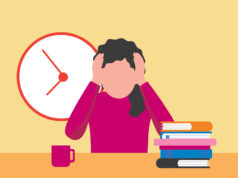Que faire lorsque vos soucis vous empêchent de dormir
C’est l’heure du coucher, et pas une créature ne s’agite… sauf pour votre esprit de course, c’est-à-dire. Comment se fait-il que même après une journée relativement sans anxiété, notre esprit s’emballe parfois lorsque nos têtes frappent l’oreiller?
La psychologue Susan Albers, PsyD, explique comment calmer l’anxiété la nuit et même l’empêcher de se produire en premier lieu.
Pourquoi ressentez-vous de l’anxiété la nuit?
Lorsque vous vous allongez la nuit pour vous détendre, votre cerveau se tourne vers tous les soucis pour lesquels il n’a pas eu le temps pendant la journée. Souvent, cette anxiété tourne autour de soucis que vous ne pouvez pas résoudre sur le moment.
« Toutes les choses qui ont été mises en veilleuse viennent au premier plan de votre tête », dit le Dr Albers. « Sans demandes concurrentes pour votre attention, ces inquiétudes deviennent souvent plus fortes et plus prononcées. »
Le stress diurne chronique met votre corps en surmenage et taxe vos hormones et votre système surrénalien, qui sont directement liés au sommeil – de sorte que les troubles du sommeil peuvent être un drapeau rouge vous disant de traiter le stress pendant vos heures d’éveil.
L’anxiété nocturne peut déclencher un cercle vicieux : une mauvaise nuit de sommeil entraîne l’épuisement le lendemain et perturbe les rythmes naturels de votre corps. « Cela vous rend plus vulnérable à l’anxiété pendant la journée qui peut saigner dans la nuit », explique le Dr Albers. Et ainsi le cycle se répète.
Settle into your routines
When it comes to sleep, routine is your best friend.
- Eating at the same time every day helps regulate your circadian rhythms.
- Eating breakfast signals that it’s time for your body to wake up.
- Regular daytime exercise releases endorphins and decreases levels of cortisol, the hormone behind stress.
- Going to bed at the same time every night teaches your body to get sleepy around the same time.
But if you want to lessen nighttime anxiety, it’s still important to implement a specific nighttime routine.
“You can’t expect to go from 100 mph and then suddenly stop,” Dr. Albers says. Instead, institute a 30-minute transition between bedtime and the rest of your day.
Try quiet, tech-free activities that reduce your cortisol levels and help ease you into sleep, such as:
- Taking a bath.
- Reading a book.
- Journaling.
- Doing yoga stretches.
Try these pre-sleep snacks
If you’re worried you’ll be too worried to fall asleep, head off nighttime anxiety with these all-natural tricks:
- Drink tart cherry juice or eat a bowl of tart cherries. Studies show that tart cherry consumption can help you sleep for up to 85 minutes longer because they’re a source of melatonin, a sleep aid that reduces inflammation in the body.
- Make a mug of chamomile tea. This ancient herbal tea has been clinically shown to help reduce anxiety and promote sleep.
- Pop a Brazil nut or two. These big, buttery tree nuts are one of the world’s best sources of selenium, which can help your thyroid run smoothly and thus aid in sleep. Just two Brazil nuts have been shown to be as helpful as a selenium supplement.
Try not to consume caffeine late in the day, whether in coffee or elsewhere. “Be mindful of what you’re consuming,” Dr. Albers says, “because too much caffeine can exacerbate existing anxiety.”
Put your phone to bed
Just say no to doomscrolling before bed — the practice of taking in a barrage of bad news online. “Give your phone a bedtime before your own,” Dr. Albers advises.
And if anxiety keeps you awake or wakes you up, resist the temptation to break this rule and start using your phone. Your phone’s blue light signals your brain to turn back on, ultimately making it even harder to get to sleep.
“This is a No. 1 no-no for helping you fall back to sleep,” Dr. Albers warns.
If you can’t sleep…
If you wake up with anxiety in the middle of the night, these practical tips can help you stop tossing and turning:
- Write it down. Keep a journal next to your bed where you can jot down your worries. “This helps you to detach and let it go,” Dr. Albers says.
- Try an app. Apps such as Calm, Headspace®, or the Cleveland Clinic’s Mindful Moments share relaxing sleep stories to help soothe your mind.
- Listen to soothing music. Studies show that relaxing tunes can calm your autonomic nervous system, which leads to slower breathing, reduced heart rate, and lower blood pressure, all of which help you sleep.
- Get up but stay calm. If you simply can’t snooze, it’s OK to get out of bed — just be smart about what you do next. “Choose an activity that is relaxing rather than a task or activity that turns on your brain full-throttle,” Dr. Albers says. She recommends routine, low-engagement tasks such as packing your lunch and folding the laundry.
And try to avoid self-medication with food, alcohol, or sleep aids, which can provide short-term help but won’t get to the root of your issues.
Meditate on it
« Vos habitudes respiratoires sont un signal », explique le Dr Albers. « Lorsque votre respiration ralentit, cela envoie un message à votre cerveau et à votre corps qu’il est temps d’aller dormir. » Elle suggère cette technique de respiration 4-7-8 du Dr Andrew Weil:
- Séparez doucement vos lèvres.
- Expirez, en faisant un son « whoosh » comme vous le faites.
- Inspirez silencieusement en pressant vos lèvres ensemble pour un compte de quatre.
- Pour un compte de sept, retenez votre souffle.
- Expirez pour un compte de huit et faites à nouveau le bruit de sifflement.
- Répétez cela quatre fois lorsque vous commencez pour la première fois; travailler jusqu’à huit répétitions.
Enfin, si rien ne semble aider votre anxiété nocturne, consultez un médecin ou un thérapeute, qui peut vous aider à faire toute la lumière sur les conditions médicales sous-jacentes ou les troubles anxieux.
Lorsque vous (essayez de) vous endormir, rappelez-vous: la pleine conscience est la clé. Plutôt que de vous inquiéter de l’avenir, concentrez-vous sur ce qui est sous votre contrôle en ce moment, comme vous endormir.











[…] spécialisées et se concentre sur le client et le thérapeute découvrant la cause profonde de l’anxiété et d’autres défis émotionnels. Dans la société, il y a souvent une vision de la culture pop […]